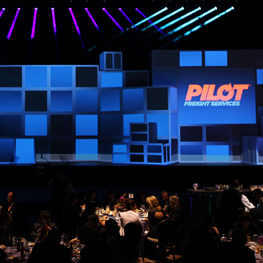Boost Your Brand's Picture Via Expert Event Productions
Boost Your Brand's Picture Via Expert Event Productions
Blog Article
Recognizing How Occasions Manufacturing Functions: A Comprehensive Overview of the Refine
The intricacies of occasion manufacturing demand a systematic approach that incorporates numerous stages, each playing a vital function in the general success of an event. Understanding the subtleties of budgeting, resource allotment, and on-site management is crucial for any type of professional in this field.
Initial Preparation and Principle Growth
Reliable preliminary planning and principle advancement serve as the foundation for effective events manufacturing. This stage includes defining the occasion's function, target audience, and wanted results. A clear vision is important; it overviews all subsequent decisions and assists line up the team's initiatives toward a typical objective.
During this phase, conceptualizing sessions can be very useful. Engaging stakeholders, consisting of customers, enrollers, and possible guests, promotes a collective setting that creates cutting-edge ideas. In addition, comprehensive marketing research should be carried out to understand patterns, choices, and possible difficulties.
Once the idea is established, it is important to develop an in-depth event outline. This outline should consist of the event's style, layout, and key tasks. Establishing a timeline is equally vital, as it aids to take care of tasks and deadlines properly.
Budgeting and Resource Allotment
With a solid concept in position, attention needs to transform to budgeting and source appropriation, which are essential elements in executing the event successfully. A well-defined budget functions as a roadmap, outlining all expected expenses and available resources. It begins with determining fixed and variable costs, consisting of location leasing, food catering, staffing, advertising and marketing, and innovation. Each category must be thoroughly determined to prevent overspending and to guarantee that funds are alloted suitably.
Source allocation entails assigning both economic and human resources to various tasks and elements of the event. Prioritization is vital; essential elements must receive adequate financing while much less vital aspects may require an extra conservative technique. Contingency planning is critical-- allocating a section of the budget for unanticipated costs can reduce economic risks.
In enhancement, efficient interaction amongst employee regarding budget restraints cultivates cooperation and advancement. This advertises the liable use of resources and motivates innovative solutions to stay within budget. Inevitably, a critical technique to budgeting and resource allocation lays the groundwork for a successful event, making it possible for coordinators to concentrate on supplying a remarkable experience for guests while maintaining monetary stability.
Logistics and Sychronisation
Browsing the intricacies of logistics and sychronisation is necessary for the seamless execution of any occasion. This phase includes careful planning and organization to make sure that all parts operate in harmony. Secret elements consist of place choice, transport setups, and the organizing of numerous tasks.
This consists of recognizing the design, accessibility points, and readily available resources. Working with these aspects requires go to the website partnership with vendors, providers, and transport services to make sure prompt distributions and pick-ups.
An additional critical facet is the development of a comprehensive timeline that outlines all logistical aspects leading up to the occasion. This timeline offers as a roadmap, describing key turning points and target dates for tasks such as tools setup, catering services, and audiovisual setups. Normal communication with all stakeholders is vital to deal with any potential concerns proactively.
Execution and On-Site Monitoring
Effective execution and on-site management are crucial for transforming careful strategies right into fact throughout an occasion. This phase involves the smooth control of different aspects, making certain that every information aligns with the established vision. On-site managers play a critical duty, serving as the central factor of interaction among suppliers, personnel, and stakeholders. Their capability to make real-time choices can substantially affect the event's success.
A well-defined timetable is vital, working as a roadmap for all tasks. Event managers should make certain that arrangement takes place on time, adhering to timelines for sound checks, providing shipments, and guest arrivals. Efficient problem-solving skills are additionally essential; unanticipated difficulties can emerge, requiring quick reasoning and adaptability to preserve the event's flow.
Additionally, focus to guest experience is paramount. Keeping track of guest communications, making certain security procedures are adhered to, and giving support staff to attend to worries cultivates a favorable ambience. This degree of interaction not just enhances the general experience but also mirrors the professionalism and reliability of the occasion team. Event Productions. Ultimately, effective implementation and on-site monitoring joint on detailed preparation, reliable communication, and a commitment to supplying an exceptional event for all involved.

Post-Event Analysis and Comments
The end result of any event lies not just in its implementation but also in the complete evaluation that adheres to. Post-event examination is vital for identifying the total success of the occasion and recognizing areas for improvement. This process normally involves gathering comments from different stakeholders, including guests, vendors, and staff member, to obtain a comprehensive point of view on their experiences.
To structure the analysis, occasion coordinators frequently make use of studies and interviews, concentrating on vital performance indicators such as guest complete satisfaction, logistical efficiency, and spending plan adherence. Analyzing this data permits organizers to evaluate whether the occasion fulfilled its objectives and to comprehend the strengths and weak points of the execution.
In addition, putting together a thorough report Check This Out summing up the findings is great site critical for future recommendation. This paperwork not just functions as a beneficial resource for preparing subsequent events yet also fosters a culture of constant renovation within the company. By systematically dealing with comments and applying changes, event specialists can improve their approaches, eventually causing more impactful and successful occasions. To conclude, post-event analysis is a crucial action in the event manufacturing procedure that makes sure recurring development and excellence in future ventures.
Final Thought

The intricacies of occasion production need a methodical strategy that integrates several phases, each playing an essential role in the general success of an event.With a strong principle in place, focus needs to turn to budgeting and resource allotment, which are essential elements in carrying out the occasion successfully.Resource allowance entails assigning both economic and human sources to numerous tasks and components of the event. Inevitably, a strategic approach to budgeting and source allotment lays the groundwork for an effective occasion, allowing coordinators to focus on supplying a remarkable experience for participants while maintaining economic honesty.

Report this page